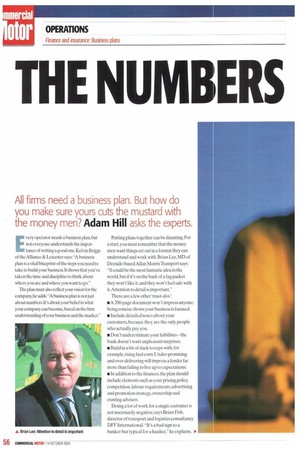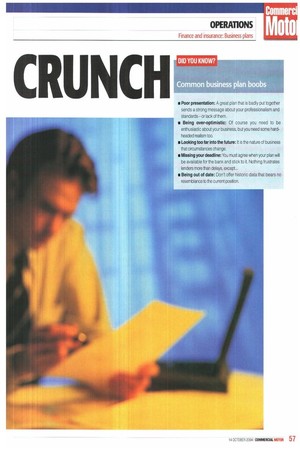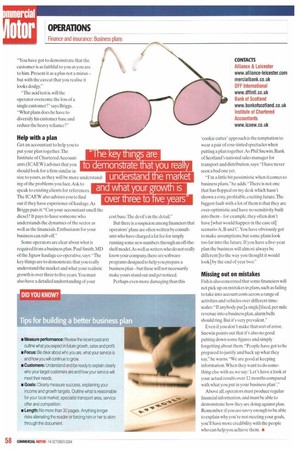THE NUMBERS
Page 58

Page 59

Page 60

If you've noticed an error in this article please click here to report it so we can fix it.
CRUNCH
All firms need a business plan. But how do you make sure yours cuts the mustard with the money men? Adam Hill ass the experts.
Every operator needs a business plan, but not everyone understands the importance of writing a good one. Kelvin Briggs of the Alliance & Leicester says: "A business plan is a vital blueprint of the steps you need to take to build your business. It shows that you've taken the time and discipline to think about where you are and where you want to go."
The plan must also reflect your vision for the company,he adds: "A business plan is not just about numbers. It's about your belief in what your company can become,based on the firm understanding of your business and the market" Putting plans together can be daunting. For a start, you must remember that the money men want things set out in a format they can understand and work with. Brian Lee, MD of Deeside-based Allan Morris Transport says: "It could be the most fantastic idea in the world, but if it's on the back of a fag packet they won't like it, and they won't feel safe with it.Attention to detail is important.
There are a few other 'must-dos': • A 200-page document won't impress anyone; being concise shows your business is focused.
• Include detailed notes about your customers, because they are the only people who actually pay you.
• Don't underestimate your liabilities the bank doesn't want unpleasant surprises.
• Build in a bit of slack to cope with, for example, rising fuel costs. Under-promising and over-delivering willimpress a lender far more than failing to live up to expectations.
• In addition to the finances, the plan should include elements such as your pricing policy competition, labour requirements, advertising and promotion strategy, ownership and existing advisers.
Doing a lot of work for a single customer is not necessarily negative, says Brian Fish, director of transport and logistics consultancy D1FF International. "It's a had sign to a banker but typical for a haulier," he explains. 11. "You have got to demonstrate that the customer is as faithful to you as you are to him. Present it as a plus not a minus but with the caveat that you realise it looks dodgy," "The acid test is, will the operator overcome the loss of a single customer?" says Briggs. "What plans does he have to diversify his customer base and reduce the heavy reliance?
Help with a plan
Get an accountant to help you to put your plan together.The Institute of Chartered Accountants (ICAEW) advises that you should look for a firm similar in size to yours, as they will be more understanding of the problems you face. Ask to speak to existing clients for references. The ICAEW also advises you to find out if they have experience of haulage. As Briggs puts it: "Can your accountant smell the diesel? It pays to have someone who understands the dynamics of the sector as well as the financials. Enthusiasm for your business can rub off."
Some operators are clear about what is required from a business plan. Paul Smith, MD of the Jigsaw haulage co-operative, says: "The key things are to demonstrate that you really understand the market and what your realistic growth is over three to five years. You must also have a detailed understanding of your cost base.The devil's in the detail."
But there is a suspicion among financiers that operators' plans are often written by consultants who have charged a fat fee for simply running some new numbers through an off-theshelf model.As well as writers who do not really know your company,there are software programs designed to help you prepare a business plan -but these will not necessarily make yours stand out and get noticed.
Perhaps even more damaging than this 'cookie cutter' approach is the temptation to wear a pair of rose-tinted spectacles when putting a plan together. As Phil Snewin, Bank of Scotland's national sales manager for transport and distribution, says: "I have never seen a bad one yet.
"I'm a little bit pessimistic when it comes to business plans," he adds. "There is not one that has flopped on my desk which hasn't shown a rosy, profitable, exciting future.The biggest fault with a lot of them is that they are over-optimistic and have no sensitivity built into them for example, they often don't have [what would happen in the case of] scenario A,B and C. You have obviously got to make assumptions, but some plans look too far into the future. If you have a five-year plan the business will almost always be different [to the way you thought it would look] by the end of year two."
Missing out on mistakes
Fish is also concerned that some financiers will not pick up on mistakes in plans, such as failing to take into account costs across a range of activities and vehicles over different timescales: "If anybody put [a single] fixed,per mile revenue into a business plan, alarm bells should ring. But it's very prevalent."
Even if you don't make that sort of error, Snewin points out that it's also no good putting down some figures and simply forgetting about them. "People have got to be prepared to justify and back up what they say," he warns. "We are good at keeping information. When they want to do something else with us, we say:sLet's have a look at your actual results over 12 months compared with what you put in your business plan'."
Above all operators must produce regular financial information, and must be able to demonstrate how they are doing against plan. Remember: if you are savvy enough to be able to explain why you're not meeting your goals, you'll have more credibility with the people who can help you achieve them. •


































































































































































































